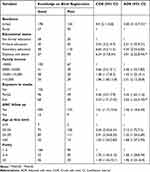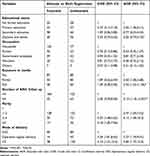Back to Journals » Risk Management and Healthcare Policy » Volume 16
Birth Notification and Registration: A Survey on Knowledge and Attitude Among Postpartum Women in Northwest Ethiopia
Authors Alemu HN, Wubneh SB, Yute AH, Tekletsadik KF, Ofgea BM, Kassie BA
Received 28 June 2023
Accepted for publication 25 October 2023
Published 31 October 2023 Volume 2023:16 Pages 2237—2248
DOI https://doi.org/10.2147/RMHP.S427926
Checked for plagiarism Yes
Review by Single anonymous peer review
Peer reviewer comments 2
Editor who approved publication: Dr Jongwha Chang
Haymanot Nigatu Alemu,1 Solomon Berhe Wubneh,2 Abezash Hayiso Yute,3 Kalkidan Firdawek Tekletsadik,3 Bekeltu Mesfin Ofgea,3 Belayneh Ayanaw Kassie4
1Department of Clinical Midwifery, School of Midwifery, College of Medicine and Health Sciences, University of Gondar, Gondar, Ethiopia; 2Department of Obstetrics and Gynecology, School of Medicine, College of Medicine and Health Sciences, University of Gondar, Gondar, Ethiopia; 3Department of General Midwifery, School of Midwifery, College of Medicine and Health Sciences, University of Gondar, Gondar, Ethiopia; 4Department of Women’s and Family Health, School of Midwifery, College of Medicine and Health Sciences, University of Gondar, Gondar, Ethiopia
Correspondence: Haymanot Nigatu Alemu, Tel +251920256611, Email [email protected]
Background: Birth registration is the official and permanent recording of a child’s birth within a civil registry, according to the legal requirements of a country. Although the Sustainable Development Goal targets providing legal identity for all by 2030, birth registration levels remain critically low. Therefore, this study aimed to assess postpartum women’s knowledge of and attitudes towards birth registration and its associated factors in Northwest Ethiopia.
Methods: An institution-based cross-sectional study was conducted from September 1– 30/2022 among 422 participants who were selected using systematic random sampling. A pretested and structured interviewer-administered questionnaire was used to collect the data. Data were entered into EPI Info 7 and analyzed using SPSS version 25. A multivariable logistic regression model was fitted to identify the factors associated with knowledge and attitudes towards birth registration. Variables with a p-value of < 0.05 were considered to be significantly associated with the dependent variable.
Results: Among the participants, 41.7% had good knowledge of birth registration. Less than one-quarter (22.6%) had a favorable attitude towards birth registration. Having a college and above educational level (AOR = 4.01, 95% CI: 2.3– 8.4), being urban resident (AOR = 3.4, 95% CI: 3.1– 7.4) and full exposure to media (AOR = 3.02, 95% CI: 1.5– 5.7) were associated with knowledge of birth registration. Having primary educational status (AOR = 2.04, 95% CI: 2.96– 8.31), being fully exposed to different media (AOR = 2.32, 95% CI: 1.22– 11.36) and having four or more antenatal care visits (AOR = 5.10, 95% CI: 1.18– 14.35) were associated with favorable attitudes towards birth registration.
Conclusion: Postpartum women had poor knowledge of and attitudes towards birth registration. Increasing educated women at all levels, awareness rising through different media and integration of birth registration with antenatal care is crucial for realizing the registration of all births by 2030.
Keywords: birth notification, birth registration, civil registration, vital statistics, postpartum women
Introduction
Birth registration is the official and permanent recording of a child’s birth within the civil registry according to the legal requirements of a country.1,2 The initial legal document constitutes information about the place of birth, date of birth, and family ties on which a child's age and nationality can be determined, thereby helping to prevent child labor and statelessness.3
Apart from individual uses, birth registration is also crucial at the national level for planning, resource allocation, and delivery and monitoring of health system programs.4,5 Moreover, birth registration is important for a wider global community because it helps track progress towards international promises.6,7
Birth registration is currently a global concern and is part of the 2030 agenda for sustainable development to provide legal identity for all, including birth registrations. Globally, an estimated 166 million children under five go unregistered each year, representing one in four. Fifty-seven percent of them are in sub-Saharan Africa.8,9 Ethiopia is one of five sub-Saharan African countries responsible for half of unregistered children under the age of five worldwide. Therefore, if progress is not accelerated, by 2030 the number of unregistered children will become more by 100 million.8
In Ethiopia, civil registration of vital events started during the enactment of the 1960 Civil Code of Ethiopia.10 Birth is one of the vital events recorded in the office of civil status. Ethiopia's revised family law, issued in July 2000, considers birth registration one of the fundamental rights of children. In 2012, a vital event registration agency responsible for birth registration was established. Despite the existence of birth registration and vital event registration agencies, coverage remains very low.11 According to the 2016 Ethiopian demographic health survey (EDHS 2016), only 3% of children under the age of five were registered.12 Not only is coverage very low but there is also a drop from the previous national report on birth registration in the 2005 EDHS.12
Studies have also revealed that limited awareness regarding the importance and process of birth registration, negative attitude by parents, long time taken to registration centers, and high registration costs hinder childbirth registration.13–16 UNICEF also reported a similar finding that a significant number of unregistered children occur in women with low levels of awareness about birth registrations.17 Studies in Nigeria and parts of Ethiopia including selected district of Tigray region, Hawassa city administration and its neighborhoods, SNNPS and Addis Ababa revealed that knowledge on birth registration was 73%, 57.6%, 44.5%, 21.8%, and 60%, respectively.14,18,19
Therefore, there is a need to assess the knowledge and attitudes toward birth registration among postpartum mothers at Gondar University Hospital. There is also a need to identify factors affecting knowledge and attitude toward birth registration among postpartum mothers at Gondar University Hospital.
Methods
Study Design, Area, and Period
This institution-based cross-sectional study was conducted from to September 1–30, 2022. This study was conducted at the University of Gondar (UoG) Comprehensive Specialized Hospital in the Amhara Regional State, northwest Ethiopia. It is located in Northwest Ethiopia, approximately 748 km from Addis Ababa, Ethiopia’s capital city. It is one of the largest hospitals in the country, with more than 13,000 deliveries per year. The hospital provides birth notification services for all births.
Study Population
Immediate postpartum women who gave birth at the University of Gondar Comprehensive Specialised Hospital during the study period. Postpartum women who were critically ill or unable to communicate were excluded.
Sample Size Calculation and Sampling Procedure
The sample size was determined using a single-population proportion formula. Due to the unknown proportion of knowledge of birth registration among postpartum women in Gondar, Ethiopia, a 50% proportion was estimated. Thus, the calculated sample size was 422, assuming that the proportion of knowledge regarding birth registration was 50%, 95% confidence level, 5% margin of error, and 10% non-response rate.
Based on the hospital report, an average of 1000 women will give birth at the hospital each month. We calculated the K interval, to was 2.4~2. The first postpartum woman was randomly selected using the lottery method. We then selected and interviewed the study participants every second until the required number of participants is acquired.
Dependent Variables
Knowledge towards Birth registration (good/poor),
Attitude towards Birth registration (Favorable/Unfavorable)
Independent Variables
Sociodemographic characteristics (age, residence, religion, marital status, occupation, educational status, income, family size, distance from facility, and exposure to media) and reproductive-related characteristics (parity, ANC follow-up, status of pregnancy, and mode of delivery).
Operational Definition
Knowledge of Birth Registration
The level of knowledge of the study participants was evaluated using 10 knowledge assessing questions. Values of 1 and 0 were set for correct and incorrect responses, respectively. Participants who scored greater than or equal to the mean score (1.34) were considered to have good knowledge, while those who scored less than the mean score were considered to have poor knowledge.19
Attitude Towards Birth Registration
Attitudes of women towards birth registration were also evaluated based on seven Likert scale questions. The answer categories for these questions were “strongly agree”, “agree”, “neutral”, “disagree”, and “strongly disagree” and were recoded as 5,4,3,2, and 1, respectively, for positive statements, and vice versa for negative statements. Participants who scored greater than or equal to the mean score (2.64) on the attitude questions were labeled as having a favorable attitude, whereas those who scored less than the mean score were considered to have an unfavorable attitude towards birth registration.19
Media Exposure
We categorized the mothers’ exposure to media into three levels based on their response to how often they listened to radio, watched television, and read newspapers. Women who did not listen to the radio, watch television, or read newspapers at least once a week were categorized as having no media exposure. Mothers exposed to one or two of the three forms of media were categorized as having partial media exposure. Mothers exposed to all three forms of media were categorized as having full media exposure.20
Data Collection Tools and Procedure
The data collection tool was developed by reviewing related literature.1,14,18–24 The data collection tool contains socio-demographic variables, reproductive-related characteristics, 10-item knowledge assessment questions, and 7-item Likert scale questions to assess attitudes towards birth registration. Data were collected through face-to-face interviews, using a structured questionnaire.
Data Quality Controls
The questionnaires were first prepared in English, then translated into Amharic, and back to English by members of the research team. To ensure that the questions were relevant and understandable, a pre-test was conducted among 15 postpartum women at Gondar Health Center. One day of training was provided to data collectors and supervisors. The data were collected by three graduate BSc midwives and supervised by two master’s instructors. During the data collection period, the principal investigator and supervisors checked the questionnaires daily for completeness.
Data Processing and Analysis
Data cleaning and cross-checking were performed before data analysis, checked, coded, and entered into EPI Info version 7 and analyzed using SPSS version 25. Descriptive and analytical statistics were also calculated. In bivariate logistic regression analysis, variables with a p-value less than 0.2 go into the multivariable logistic regression analysis to control for possible confounders. In the multivariable logistic regression analysis, a p-value ≤0.05 with a 95% confidence interval for the adjusted odds ratio was used to determine the significance of the association. Hosmer and Lemeshow goodness-of-fit was used to test the final model for model fitness.
Results
Socio-Demographic Characteristics
A total of 422 postpartum women at Gondar University Hospital participated in this study, with a response rate of 100%. The median age of the study participants was 28 years with interquartile range (IQR) of 25–30 years. The majority of participants (90.3%) were married and nearly three-quarters (71.6%) had urban residency. More than three-quarters of the study participants (78.4%) were orthodox religious followers and 179 (42.4%) were housewives. Less than one-fourth (23.7%) attended primary education (Table 1).
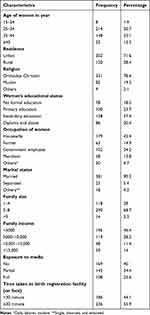 |
Table 1 Sociodemographic Characteristics of Postpartum Mother in Gondar University Hospital, Northwest Ethiopia, 2022 (n = 422) |
Obstetrics Related Factors
Nearly half (47.4%) of the study participants gave their first birth at the age of 25–29 years. Although majority (94.1%) of study participants had ANC follow-up, only 108 (27.2%) had complete ANC follow-up. Of the 422 participants, 188 (44.5%) gave birth through spontaneous vaginal birth (Table 2).
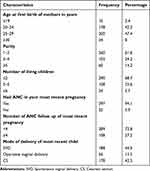 |
Table 2 Obstetrics-Related Characteristics of Postpartum Mother in Gondar University Hospital, Northwest Ethiopia, 2022 (n = 422) |
Provision of Birth Notification and Advice
Two-third (65%) of immediate postpartum mothers received birth notification papers containing important information regarding newborns including birth dates, names, sex, and modes of delivery. Only a few 58 (13.7%) immediate postpartum mothers got advice from health-care providers about the process of birth registration. Less than one –fourth (22.7%) of immediate postpartum mothers had plans to register their newborn.
Knowledge of Postpartum Mother About Birth Registration
Of the 422 participants, 41.7% had adequate knowledge about birth registration, with a 95% confidence interval (CI of 36.4–42.9%). Among the participants included in the study, 58.3% had heard of birth registrations. Nearly half (48%) of the participants reported that health workers were a major source of information about birth registration (Table 3).
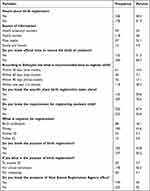 |
Table 3 Knowledge of the Postpartum Mother About Birth Registration in Gondar University Hospital, Northwest Ethiopia, 2022 (n = 422) |
Factors Associated with Knowledge of Postpartum Mother About Birth Registration
Bivariate logistic regression analysis was performed to select variables for the multivariable logistic regression analysis. Bivariate logistic regression showed that residency, educational status, family income, exposure to media, ANC follow-up, age at first birth, and parity were associated with postpartum mothers’ knowledge. Multivariate logistic regression analysis revealed that educational status, residency, and exposure to media were significantly associated with postpartum mothers’ knowledge.
Postpartum mothers with a college or higher educational level were four times more knowledgeable than those with no formal education (AOR = 4.01, 95% CI: 2.3–8.4). Mothers from urban areas were 3.4 times more knowledgeable than those from rural areas (AOR = 3.4, 95% CI: 3.1–7.4). Mothers who were fully exposed to media were three times more likely to have adequate knowledge than their counterparts (AOR = 3.02, 95% CI: 1.5–5.7) (Table 4).
Attitude of Postpartum Mother About Birth Registration
Less than one-quarter (22.6%) (95% CI: 20.1–32.5%) had a favorable attitude towards birth registration, in which 50% of women strongly agreed that birth registration was necessary. Approximately 35.6% of mothers believed that birth registration helps avoid incorrect age estimation. In addition, 27.3% of respondents considered penalized birth registration defaulters (Table 5).
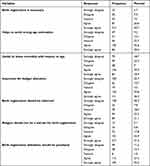 |
Table 5 Attitude of the Postpartum Mother About Birth Registration in Gondar University Hospital, Northwest Ethiopia, 2022 (n = 422) |
Factors Associated with Attitude of Postpartum Mother About Birth Registration
Bivariable logistic regression analysis was performed to select variables for the multivariable logistic regression analysis. Bivariate logistic regression showed that educational status, occupation, exposure to media, number of ANC follow-ups, parity, and mode were associated with the attitudes of postpartum mothers. In multivariate logistic regression analysis, educational status, exposure to media, and the number of ANCs were significantly associated with the attitude of postpartum mothers.
Mothers who had completed diplomas and above educational status were two times more likely to have favorable attitudes than mothers with no formal education (AOR = 2.02, 95% CI:0.74–5.10). Mothers who had been fully exposed to different forms of media were 2.32 times more likely to have favorable attitudes than those who had no media exposure (AOR = 2.32, 95% CI:1.22–11.36). Postpartum mothers who had four or more ANC follow-ups during their recent pregnancy had five times more favorable attitudes than mothers who had fewer ANC follow-ups (AOR = 5.10, 95% CI:1.18–14.35) (Table 6).
Discussion
Knowledge of and attitudes towards birth registration were considered poor for postpartum women who participated in this study. Education and exposure to the media were positively associated with knowledge and attitudes towards birth registration. Having four or more antenatal care visits during a recent pregnancy improves a woman’s attitude towards birth registration.
In this study, about 41.7% of the study participants were knowledgeable about birth registration, with a 95% confidence interval (CI of 36.4–42.9%). This finding is lower than that of studies conducted in Eastern Ethiopia (57.6%),18 the coastal region of Kenya (99%),22 Kenya (91.5%),16 and Nigeria (73%).19 The possible explanation might be due to variations in the study setting and sociocultural differences in Kenya and Nigeria. This might be due to the difference in the source of information about birth registration in Eastern Ethiopia, since in this study, the majority of respondents said health-care providers as a source of information because either they may give incomplete information or the receiver may neglect the information by considering birth registration as a secondary priority. Furthermore, this might be due to the difference in the educational status of the study participants; approximately 47.7% of the participants attended secondary education in Nigeria, but only 37.4% attended secondary education in the current study.
The results of this study were higher than those in southern Nigeria (2.2%).1 The variation might be due to sociodemographic factors, the study setting, and time differences. The possible justification might be differences in the study design when compared to the findings in southern Nigeria; it was a community-based cross-sectional among postnatal mothers after returning to their home and unable to recall the information.
The current study revealed that postpartum mothers who had completed college and above were four times more knowledgeable than those with no formal education. This finding is supported by a study conducted on urban communities in southern Nigeria1 and the South-south region of Nigeria.25 The higher the level of education, the more easily women can know the process of registering their child without confusion because they are more exposed to educating social media, which is an important means of acquiring knowledge and advice about birth registration. Additionally, it is explained by the fact that a higher educational level enables people to access opportunities, such as employment and income, which helps increase mothers’ ability to move around and grasp knowledge of birth registration.
This study also demonstrated a significant association between residency and maternal knowledge of birth registration. Mothers who had urban residency were 3.4 times more knowledge than those from rural areas. A possible explanation might be that women residing in urban areas are close to health facilities and can easily access institutional health care without financial constraints. Therefore, healthcare service utilization allows them to obtain updated information about birth registration from health professionals.
Furthermore, this study revealed a positive association between adequate maternal knowledge of birth registration and full exposure to all forms of media. One assumption for this finding could be that, when women are exposed to different forms of media, they have an improved level of awareness because they gain repeated explanations about the registration process.
Regarding mothers’ attitudes toward birth registration, approximately 22.6% of postpartum women had favorable attitudes towards birth registration. This finding is lower than that of studies conducted in the SNNPR of Ethiopia (50%)14 and Nigeria (32%).19
The present study revealed that postpartum mothers who had a college or above educational status were twice likely to have a favorable attitude toward birth registration than those who had no formal education. This finding is supported by a study conducted in Ghana.26 It suggests that a higher educational level enables mothers to talk with people outside their social circumstances and gives them the opportunity to expose them to more information, which helps to improve their attitude toward birth registration.
Additionally, this study revealed that mothers who were fully exposed to different forms of media were 2.32 times more likely to have favorable attitudes than those who had no media exposure. One possible reason might be that media exposure leads to a better understanding of the process and benefits of birth registration.
Another important finding of this study was that postpartum mothers who had four or more ANC follow-ups had five times more favorable attitudes than mothers who had fewer than four ANC follow-ups. A possible justification might be that mothers with repeated contact with health-care professionals influence concerns regarding childcare, including birth registration.
Implication
The current study comes up with evidence on the context to which the birth notification during immediate intrapartum period as well as their knowledge and attitudes and associated factors compliance with birth registration practice. Therefore, the findings from this study look for concerned stakeholders and policymakers to pay special attention in strengthen the birth notification and advice at immediate postpartum period by health-care providers, registration by VERA centers at all levels, by continuous monitoring and evaluation of the process, decrease direct and indirect cost of registration, and increase availability registration centers.
Conclusion
Postpartum women were found to have poor knowledge of and attitudes towards birth registration. Having a college or above educational level, being an urban resident and full exposure to media were positively associated with good knowledge of birth registration. Having primary education, full exposure to different media, and four or more antenatal care visits were significantly associated with favorable attitudes towards birth registration.
Since birth registration has health, demographic, and administrative purposes, educating women at all levels is instrumental to improve birth registration practice. Moreover, integration of birth registration information with antenatal care services and improving postpartum women’s awareness of birth registration through different media is crucial to contribute to the realization of registration of all births by 2030.
Limitation of the Study
This study has some limitations that need to be addressed. First, we have no data on the practice of birth registration and thus may not be able to observe differences in knowledge, attitude, and practice of birth registration among women with and without registration of their children. Second, owing to the cross-sectional nature of the study, we could not address the causal factors of our findings.
Abbreviations
ANC, antenatal care; AOR, adjusted odds ratio; CI, confidence interval; COR, crude odds ratio; SPSS, Statistical Package for Social Sciences; EDHS, Ethiopian Demographic Health Survey; UNICEF, United Nations Children’s Fund.
Data Sharing Statement
Datasets are available from the corresponding author upon reasonable request.
Ethical Approval and Consent to Participate
Ethical clearance was obtained from the School of Midwifery under the delegation of the Institutional Review Board of the University of Gondar. The study participants were informed of the purpose of the study, and written informed consent was obtained before data collection. The study was done following the declaration of Helsinki. Postpartum women below the age of 18 years were considered emancipated minors as they already got pregnant and gave birth (a role assumed but adults) and/or either married, taking care of children, or holding other roles assumed to have the ability to make an informed decision. This has been reviewed and approved by the ethics committee.
Acknowledgments
The authors express their profound gratitude to all study participants for their willingness to participate.
Author Contributions
All the authors had significant involvement in the conception and designing the study, execution, acquisition of data, analysis and interpretation of data, took part in drafting the article, revising or critically reviewing the article, gave final approval of the version to be published, have agreed on the journal to which the article has been submitted and agree to be accountable for all aspects of the work.
Funding
No specific fund was secured for this study.
Disclosure
The authors have declared there is no competing interest.
References
1. Isara AR, Atimati AO. Socio-demographic determinants of birth registration among mothers in an urban community in southern Nigeria. J Med Trop. 2015;17(1):16. doi:10.4103/2276-7096.148567
2. Ebbers AL, Smits J, Ortega JA. Household and context-level determinants of birth registration in Sub-Saharan Africa. PLoS One. 2022;17(4):e0265882. doi:10.1371/journal.pone.0265882
3. World Bank. Incentives for improving birth registration coverage: A review of the literature. World Bank; 2018.
4. Garenne M, Collinson MA, Kabudula CW, Gómez-Olivé FX, Kahn K, Tollman S. Completeness of birth and death registration in a rural area of South Africa: the Agincourt health and demographic surveillance, 1992–2014. Glob Health Action. 2016;9(1):32795. doi:10.3402/gha.v9.32795
5. Jewkes R, Wood K. Competing discourses of vital registration and personhood: perspectives from rural South Africa. Soc Sci Med. 1998;46(8):1043–1056. doi:10.1016/S0277-9536(97)10036-3
6. Rane TM, Mahanta TG, Islam S, Gogoi PP, Gogoi B. Civil registration system (CRS) for birth and death registration in Assam–a rapid assessment. Clin Epidemiol Glob Health. 2020;8(1):117–122. doi:10.1016/j.cegh.2019.05.006
7. Setel PW, AbouZahr C, Karpati A, Bratschi M Civil Registration and Vital Statistics (CRVS), and the Sustainable Development Goals (SDGs).
8. Cappa C, Petrowski N; Fund UNCs. Birth Registration for Every Child by 2030: Are We on Track? Unicef; 2019.
9. Hereward M, Williams C, Petrowski N, Cappa C. Universal birth registration by 2030: progress and challenges. Lancet. 2019;394(10216):2211–2212. doi:10.1016/S0140-6736(19)33101-0
10. Gazeta N. The civil code of the empire of Ethiopia, Proclamation No. 165/1960. Gazet Extraordi. 1960;19:1
11. Tarekegn G. Implementation of Birth Registration Laws in Addis Ababa: Implication for the Realization of the Rights of the Child. Addis Ababa University; 2017.
12. EDHS E. demographic and health survey 2016: key indicators report. DHS Program ICF. 2005;363:364.
13. Siame SM. Challenges of Child Birth Registration in Zambia: A Case Study of Lusaka and Chongwe Districts. The University of Zambia; 2020.
14. Shamenna AT, Bedane AS, Ali AB. Assessing Knowledge, Attitude and Practice of Residents towards Civil Registration & Vital Statistics at Hawassa City Administration and Its Neighborhoods, SNNPRS, Ethiopia. Int J Adv Multidisci Soc Sci. 2020;6:13–27
15. Yaddah A. Providing Birth Registration for All in Ghana: An Assessment of Target 16.9 of Sustainable Development Goal 16. University of Ghana; 2019.
16. Pelowski M, Wamai RG, Wangombe J, et al. Why don’t you register your child? A study of attitudes and factors affecting birth registration in Kenya, and policy suggestions. J Dev Stud. 2015;51(7):881–904. doi:10.1080/00220388.2015.1010156
17. UNICEF. United Nations Children’s Fund, Every Child’s Birth Right: Inequities and Trends in Birth Registration. New York: UNICEF; 2013.
18. Abay ST, Gebre-Egziabher AG. Status and associated factors of birth registration in selected districts of Tigray region, Ethiopia. BMC Int Health Hum Rights. 2020;20(1):1–10. doi:10.1186/s12914-020-00235-x
19. Adebimpe WO, Akpatamu VO. Community knowledge, attitude, and practices regarding birth registration among women of childbearing age in Akure, Nigeria. Libyan J Med Sci. 2019;3(3):88. doi:10.4103/LJMS.LJMS_55_18
20. Kumar K, Saikia N, Navaneetham K. Determinants of birth registration in India: evidence from NFHS 2015–16. PLoS One. 2021;16(9):e0257014. doi:10.1371/journal.pone.0257014
21. Ebbers AL, Smits J. Household and context-level determinants of birth registration in Sub-Saharan Africa (Version 3.0). PLoS One. 2022;17(4):e0265882.
22. Wakibi S, Ngure E, Verma AK. An assessment of knowledge, attitude, and practices of birth and death registration in Kilifi County in the coastal region in Kenya. Biomed Res Int. 2021;2021:1–8. doi:10.1155/2021/9963703
23. Parmar SR, Jakasania AH, Rathod DM. A knowledge, attitude and practice study on registration of birth and death among the field practice area of department of community medicine BJ Medical College, Ahmedabad. Hindu. 2016;124:81.
24. Chomba MB. Determinants of Birth Registration Among Mothers in Selected Rural and Urban Communities of the Copperbelt Province, Zambia. University of Zambia; 2016.
25. Tobin EA, Obi AI, Isah EC. Status of birth and death registration and associated factors in the South-south region of Nigeria. Ann Nigerian Med. 2013;7(1):3–7. doi:10.4103/0331-3131.119979
26. Amo-Adjei J, Annim SK. Socioeconomic determinants of birth registration in Ghana. BMC Int Health Hum Rights. 2015;15(1):1–9. doi:10.1186/s12914-015-0053-z
 © 2023 The Author(s). This work is published and licensed by Dove Medical Press Limited. The full terms of this license are available at https://www.dovepress.com/terms.php and incorporate the Creative Commons Attribution - Non Commercial (unported, v3.0) License.
By accessing the work you hereby accept the Terms. Non-commercial uses of the work are permitted without any further permission from Dove Medical Press Limited, provided the work is properly attributed. For permission for commercial use of this work, please see paragraphs 4.2 and 5 of our Terms.
© 2023 The Author(s). This work is published and licensed by Dove Medical Press Limited. The full terms of this license are available at https://www.dovepress.com/terms.php and incorporate the Creative Commons Attribution - Non Commercial (unported, v3.0) License.
By accessing the work you hereby accept the Terms. Non-commercial uses of the work are permitted without any further permission from Dove Medical Press Limited, provided the work is properly attributed. For permission for commercial use of this work, please see paragraphs 4.2 and 5 of our Terms.

